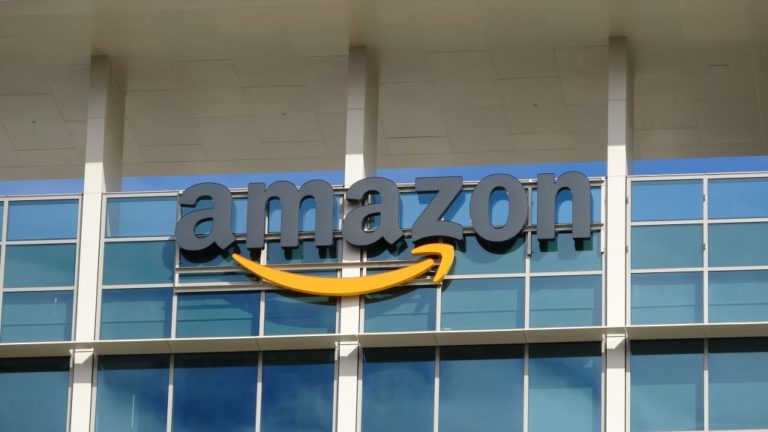
UFCW Calls on Federal Trade Commission for Action to Hold Amazon Accountable for Anti-Competitive Practices Putting Workers at Risk
WASHINGTON, DC – Today, the United Food and Commercial Workers International Union (UFCW), America’s largest retail union with 1.3 million workers, joined a coalition of major labor unions filing a complaint with the Federal Trade Commission alleging Amazon is exploiting the COVID-19 pandemic to further entrench its market dominance and calling on authorities to take action to halt the company’s growing anti-competitive behavior.
UFCW International President Marc Perrone released the following statement:
“Amazon represents a clear and present danger to American workers and our economy. The company has not only refused to acknowledge the full impact of COVID-19 on its workers, it has exploited this pandemic to increase its market dominance as well as its power over employees throughout its distribution centers.
“With more than one-third of all warehouse workers in the U.S., Amazon has a responsibility to be a leader, and to be setting strong safety standards. Instead, Amazon has chosen to ignore the dangerous working conditions its workers continue to face every day. The simple fact is that a union is the most effective counterweight to protect workers and their families from irresponsible corporate actors like Amazon, especially during a pandemic.
“As COVID-19 continues to endanger tens of thousands of these warehouse workers, federal and state government leaders must hold Amazon accountable for the dangerous working conditions in these facilities and do much more to ensure the health and safety of all of our country’s frontline workers.”
Joining UFCW in the new complaint to the Federal Trade Commission is a broad coalition of groups which includes the International Brotherhood of Teamsters, the Communications Workers of America, and Change to Win.
“We are highly alarmed by Amazon’s conduct during the unprecedented crisis brought about by the COVID-19 pandemic,” write UFCW and the coalition in the complaint to the FTC. “Amazon is taking advantage of the economic desperation and upheaval caused by COVID to engage in new or intensified conduct that further entrenches its market power and dominance.”
“The situation is urgent,” the complaint reads, as “COVID-19 allowed Amazon’s role in the economy to metastasize.” Specifically, the unions highlight:
- Amazon’s power has grown in ecommerce as the pandemic has accelerated a decades-long shift towards online retail;
- Amazon is leveraging its pandemic-strengthened position to further exploit its power over sellers, who did not abandon the company during the crisis;
- Amazon now directly employs one-third of all warehouse employees in the country, up from one-quarter before the pandemic, positioning it to further exploit workers; and
- Amazon has moved aggressively to scoop up start-ups and established companies weakened by the pandemic.
“The crisis has resulted in new weaknesses in our economy, and Amazon has not hesitated to exploit these weaknesses in ways that further bolster its hold on consumers, small businesses, and workers,” the complaint continues.
Background:
Thursday’s submission follows a sweeping petition filed by the five labor organizations in February, calling on the FTC to investigate Amazon’s anticompetitive practices.
Amazon’s Market Share Grows
The domestic e-commerce sector grew at an accelerated pace during the pandemic and Amazon stands to benefit disproportionately from that growth. Because the offline retail sector has contracted drastically, and is unlikely to recover, Amazon will hold at least 12 percent of domestic retail—offline and on—in only four years even without further growth in its market share.
The company’s overall retail market share, while notable in its own right, does not reflect Amazon’s even starker dominance in individual product categories—a more traditional metric for judging whether the company satisfies the legal definition of a monopoly. For example, Amazon was already a dominant player in electronics, with 45 percent of the domestic ecommerce electronics market in 2019. But its position has strengthened as ecommerce electronics sales have grown at the expense of in-store sales, during the pandemic, increasing 58 percent in April, according to Adobe Analytics, as all in-store sales dwindled.
Exploiting Sellers as the Pandemic Raged
The pandemic has strengthened Amazon’s grip over sellers, who have not turned to its competitors despite the company effectively cutting them off from online retail entirely during the height of the pandemic.
Amazon’s unilateral decision-making process around essential items was neither predictable nor transparent, kept sellers from accessing and earning income on their own inventory and left them with thousands of “pending” orders placed by impatient customers. Yet in spite of the enormous hindrances Amazon placed on the operations of sellers in the United States, sellers did not shift to competing platforms.
The complaint cites one possible explanation: in response to pandemic-related demand, Amazon increased its “suggested” product inventory levels for third-party sellers. If they did not maintain their “suggested” inventory levels, their products were demoted in search results and lost the “best seller” label that leads to improved sales. As a result, sellers sent all available inventory to Amazon, to the detriment of grocery and other retailers who do not disfavor sellers’ products based on their inventory levels, a ProPublica investigation cited in the complaint revealed.
“Amazon’s actions represent an extraordinary flexing of market muscle and true peril to a free market,” the complaint reads. “A company that will amass all available supplies of certain goods begins to look alarmingly like a monopsonist exercising market power. “Action such as this during a national pandemic would exploit desperate companies and people for considerable gain.”
Gaining Even More Power Over Warehouse Workers
Amazon already held a dominant share of many local warehousing and storage labor markets before it announced the hiring of 175,000 new warehouse workers, including 125,000 permanent ones, during the pandemic. As a result of its rapid expansion at a time the overall national labor market was contracting, the company gained even more power over vulnerable workers.
The company took full advantage of this power imbalance. According to a nationwide survey of 4,348 Amazon workers that Change to Win conducted between April 29 and May 9, more than a third of all Amazon workers surveyed—including those employed by Whole Foods grocery stores, and those employed by contractors staffing Amazon warehouses—specifically reported receiving no training about hazards associated with COVID-19; among warehouse workers surveyed, this proportion reached 41 percent. This was the case despite the fact that, according to the survey respondents, six in ten Amazon workers were aware of confirmed COVID-19 cases at their workplaces.
“Regulators should be concerned that Amazon’s growth as an employer has outpaced that of the warehouse sector as a whole,” the complaint reads. “Amazon’s clear awareness of its near-absolute power over warehouse workers’ wages and working conditions, exemplified by Amazon’s persistent disregard for the health and safety of these same ‘essential’ workers, indicates the consequences that such growth can have.”
Pouncing on the Weak
In the midst of all of COVID-driven market conditions, Amazon took advantage of several opportunities to acquire companies or otherwise expand its business, in ways that should be expected to further increase its power across a range of markets or market segments.
The company announced that it was acquiring self-driving vehicle start-up Zoox in late June 2020, after the six-year-old company had laid off 120 contractors and 100 employees in April, citing pressures of the pandemic. Three months after shutdowns prevented Zoox from test-driving its cars, Amazon reportedly paid $1.2 billion for the company, far less than its 2018 valuation of $3.2 billion. The acquisition quickly expands Amazon’s capacity in driverless technology, a key area of growth for the company, and one that will serve its existing goals of minimizing delivery costs, time, and reliance on humans, rather than bringing the company into an entirely new industry in which it would have to compete for customers, according to the complaint.
Amazon has reportedly shown interest in other pandemic-distressed firms in adjacent or complementary markets as well, including AMC Theaters and J.C. Penney. And it took advantage of increased pandemic-related cash flow to expand its core business, leasing 12 new Boeing 767s. While many airlines are downsizing due to COVID-19, Amazon’s, “push for faster and cheaper at-home delivery is moving ahead on an ambitious timetable,” reads an academic study cited in the complaint. “Amazon Air’s robust expansion makes it one of the biggest stories in the air cargo industry in years.”
The complaint argues that the pandemic has exposed how Amazon will assert its power when its dominance is largely unrivaled—by either brick and mortar retail or by ecommerce providers with less well-developed fulfillment operations. With the COVID-19 crisis showing no signs of abating, the time to act is now, the unions argue.
“In the absence of immediate and decisive action to curb Amazon’s most abusive practices and its market power, a dominant Amazon—that edges out or undercuts competitors across a wide swath of industries, from consumer merchandise to movie content to delivery technology, and squeezes dry all the various players up and down its vertical supply chain—could be here to stay,” the complaint concludes.
###
The UFCW is the largest private sector union in the United States, representing 1.3 million professionals and their families in healthcare, grocery stores, meatpacking, food processing, retail shops and other industries. Our members serve our communities in all 50 states, Canada and Puerto Rico. Learn more about the UFCW at www.ufcw.org.



